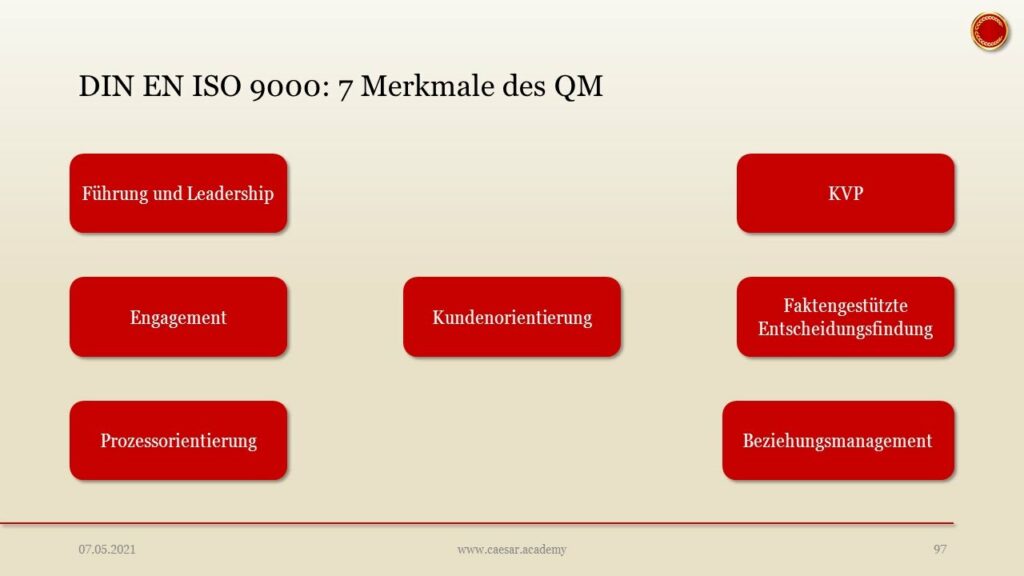
ISO 9000 is a Quality Management System
🔍 When it comes to ensuring quality in business operations, ISO 9000 is a name that stands out. This internationally recognized quality management system provides a framework for organizations to establish and maintain effective processes. By adhering to ISO 9000 standards, companies can enhance customer satisfaction, improve operational efficiency, and achieve greater consistency in their products and services.
💼 ISO 9000 sets forth a series of guidelines and best practices for quality management that can be applied to various industries and sectors. It emphasizes the importance of customer focus, leadership involvement, and continual improvement. By implementing the ISO 9000 system, companies can establish clear goals and objectives, identify potential risks, and implement measures to mitigate them.
📈 One of the key benefits of the ISO 9000 system is its ability to foster a culture of continuous improvement within organizations. By regularly monitoring and evaluating their performance against the ISO 9000 standards, companies can identify areas for improvement and implement corrective actions. This iterative process helps them enhance their efficiency, reduce defects, and deliver better products and services to their customers.
💡 In today’s highly competitive market, ISO 9000 certification can also give companies a competitive edge. Being certified demonstrates their commitment to quality and helps build trust with customers and stakeholders. It can also open new opportunities for business expansion, as many clients and partners prefer to work with ISO 9000 certified companies.
✨ Overall, ISO 9000 is a proven quality management system that provides organizations with the framework and tools to enhance their operational efficiency, improve customer satisfaction, and achieve sustainable growth. By implementing the ISO 9000 standards, companies can lay a solid foundation for success in today’s dynamic business environment.
Understanding ISO 9000 and its Importance
🔍 Understanding ISO 9000 and its Importance
ISO 9000 is an internationally recognized quality management standard that provides organizations with a systematic approach to ensure a consistent level of quality in their products and services. It is designed to help companies meet the needs and expectations of their customers while also improving efficiency and reducing costs.
ISO 9000 is based on a set of quality management principles, including a strong customer focus, leadership involvement, evidence-based decision making, and continuous improvement. By implementing ISO 9000, organizations can establish a clear framework for quality management and create a culture of excellence within their operations.
The importance of ISO 9000 cannot be overstated. By obtaining ISO 9000 certification, companies can demonstrate to their customers and stakeholders that they have implemented a robust quality management system. This can enhance their reputation and competitiveness in the marketplace, as customers are more likely to trust and prefer companies that have demonstrated a commitment to quality.
ISO 9000 certification also brings about numerous benefits for organizations. It can help improve customer satisfaction by ensuring consistent quality in products and services, leading to increased customer loyalty and repeat business. Additionally, ISO 9000 can drive operational efficiency by identifying and addressing inefficiencies and bottlenecks in processes, resulting in cost savings and improved productivity.
In summary, Understanding ISO 9000 and its importance is crucial for organizations aiming to establish and maintain a high level of quality in their operations. The standard provides a structured approach to quality management, leading to increased customer satisfaction, improved efficiency, and enhanced reputation. By embracing ISO 9000, companies can position themselves as leaders in their industry and ensure long-term success.
The Benefits of Implementing ISO 9000
😃
Implementing ISO 9000 can bring numerous benefits to an organization. 🌟 One of the most significant advantages is improved quality management. By adhering to the ISO 9000 standards, companies can establish effective quality control processes, ensuring consistency and reliability in their products or services. This not only enhances customer satisfaction but also boosts the company’s reputation, making it stand out in a competitive market.
✨ Another advantage of implementing ISO 9000 is increased operational efficiency. ISO 9000 requires organizations to analyze their processes, identify areas for improvement, and implement corrective actions. This continuous improvement approach leads to optimized operations, streamlined procedures, and reduced waste. As a result, organizations become more efficient, productive, and cost-effective, ultimately contributing to their long-term success.
📈 ISO 9000 certification can also open doors to new business opportunities. Many potential clients and partners prioritize working with ISO-certified companies, as it demonstrates their commitment to quality and customer satisfaction. Being ISO 9000 certified can give organizations a competitive edge, enabling them to win lucrative contracts, expand their customer base, and enter new markets with confidence.
💼 Additionally, implementing ISO 9000 can positively impact employee engagement and motivation. The standards emphasize the importance of employee involvement, training, and empowerment. This creates a culture of accountability, teamwork, and continuous learning, where employees feel valued and motivated to contribute their best. As a result, organizations experience higher employee satisfaction, lower turnover rates, and a more productive workforce.
These are just a few of the numerous benefits an organization can reap by implementing ISO 9000. The standards provide a framework for excellence, enabling companies to establish robust quality management systems and drive continuous improvement. Whether it’s improved customer satisfaction, increased operational efficiency, new business opportunities, or enhanced employee engagement – ISO 9000 can be a game-changer for organizations aiming to thrive in today’s competitive business landscape.
- 📚💡 Descubre los principales términos y definiciones de la norma ISO 9000
- 🏆 Logra la excelencia con la ⚙️ certificación ISO 9002: Guía completa y paso a paso
- 🚫️ Las desventajas de la norma ISO 9000: ¿Cómo afecta a tu empresa?
- 🌟 ¡Descubre todo sobre la ISO 9001 última versión 2018! ¿Qué cambios trae?
- 🏆 ¿Por qué las 🏢 Empresas con Certificación ISO 9001:2008 son sinónimo de éxito?
ISO 9000 Certification: What You Need to Know
📚 ISO 9000 Certification: What You Need to Know 📚
The ISO 9000 certification is a widely recognized quality management system that helps organizations ensure they meet customer requirements and continuously improve their processes. If you’re wondering what ISO 9000 certification entails and why it’s important, keep reading!
✅ The Basics:
ISO 9000 is a set of international standards that provide guidelines for implementing quality management systems. These standards are applicable to organizations of all sizes and in any industry. By obtaining ISO 9000 certification, companies demonstrate their commitment to delivering high-quality products and services.
🔍 Benefits of ISO 9000 Certification:
Obtaining ISO 9000 certification offers numerous benefits. Firstly, it enhances customer confidence by showcasing your organization’s commitment to quality and customer satisfaction. Secondly, it can improve your competitiveness in the market, as many clients and partners consider ISO 9000 certification a prerequisite for collaboration. Additionally, the certification can lead to increased operational efficiency, cost savings, and better risk management.
🔑 The Certification Process:
To obtain ISO 9000 certification, organizations must follow a series of steps. It typically begins with a gap analysis to identify areas that need improvement. This is followed by the implementation of a quality management system that aligns with the ISO 9000 standards. After the system is implemented, an external certification body conducts an audit to assess compliance. Once the audit is successful, the organization is awarded ISO 9000 certification.
⚡️ Continuous Improvement:
ISO 9000 certification is not a one-time achievement. It requires ongoing commitment to continuous improvement. Organizations must regularly review and update their quality management systems to ensure they remain effective and aligned with evolving customer needs and industry trends. Through periodic audits and assessments, companies can identify areas for improvement and implement corrective actions.
So, if you want to enhance your organization’s quality management practices, gain a competitive edge, and demonstrate your commitment to customer satisfaction, ISO 9000 certification is worth considering. Ensure you follow the necessary steps and embrace ongoing improvement to reap the full benefits of this internationally recognized standard.
Common Misconceptions about ISO 9000
📢 ¡Atención a todas las empresas y profesionales! ⚠️
Como blogger especializado en temas de gestión de calidad, no puedo dejar pasar la oportunidad de abordar uno de los temas más importantes en el ámbito de la ISO 9000: los conceptos erróneos comunes que hay sobre este estándar internacional. A menudo, se tiende a malinterpretar o malinformar sobre él, lo que puede llevar a decisiones equivocadas y pérdida de oportunidades de mejora.
✅ Uno de los errores más frecuentes es creer que la certificación ISO 9000 garantiza automáticamente la calidad de los productos o servicios de una empresa. Sin embargo, la ISO 9000 es un conjunto de normas que establece los requisitos para un sistema de gestión de calidad efectivo. La certificación simplemente confirma que la empresa cumple con esos requisitos, pero no garantiza la calidad en sí misma. La calidad real depende de la correcta implementación y mejora continua del sistema.
✅ Otra idea equivocada es la creencia de que la ISO 9000 solo es relevante para grandes empresas o industrias específicas. ¡Nada más alejado de la realidad! La ISO 9000 puede aplicarse a cualquier organización, sin importar su tamaño, sector o ubicación geográfica. Este estándar se centra en la mejora de procesos y la satisfacción del cliente, aspectos cruciales para el éxito de cualquier negocio, independientemente de su naturaleza.
✅ Existe también la creencia de que la implementación de la ISO 9000 es un proceso complejo y costoso. Es cierto que llevar a cabo una adecuada implementación requiere tiempo, esfuerzo y recursos, pero no necesariamente debe ser un proceso complicado y costoso. Con un plan bien estructurado, una buena formación y el compromiso de toda la organización, es posible implementar la ISO 9000 de manera efectiva y dentro de un presupuesto razonable.
✅ Por último, pero no menos importante, se tiende a pensar que la ISO 9000 es únicamente una preocupación del departamento de calidad. Esto es un gran error. La ISO 9000 implica a todos los departamentos y niveles de una organización, ya que se basa en la participación y el compromiso de todos los miembros. Todos deben entender su papel en la calidad, desde la alta dirección hasta los empleados en el terreno.
Como se puede apreciar, las ideas equivocadas sobre la ISO 9000 pueden generar confusión y obstaculizar la mejora y el crecimiento de una empresa. Es crucial desmitificar estas concepciones erróneas y comprender la verdadera importancia y beneficios que la ISO 9000 puede aportar a cualquier organización dispuesta a mejorar sus procesos y alcanzar la excelencia en la calidad.
Deja atrás los engaños y miedos, ¡abrázate a la ISO 9000 y toma el control de tu calidad! 🔒🚀
Key Steps to Achieve ISO 9000 Compliance
🔑✅ Achieving ISO 9000 compliance is a critical step for companies striving to meet international quality standards. In today’s competitive business environment, adhering to ISO 9000 requirements can significantly boost credibility and trust among clients and stakeholders. However, the process of achieving compliance can be complex and time-consuming. In this article, we will discuss the key steps that organizations should take to achieve ISO 9000 compliance.
Evaluation and Gap Analysis
First and foremost, conducting a thorough evaluation and gap analysis is crucial. This step involves assessing the existing quality management system against the ISO 9000 standards. By identifying any gaps or areas that need improvement, organizations can develop a roadmap for achieving compliance. It is important to involve all relevant stakeholders and departments in this process to ensure a comprehensive evaluation.
Establishing Quality Objectives
Once the evaluation is complete, organizations must establish clear and measurable quality objectives. These objectives should align with the ISO 9000 standards and the company’s overall goals. By setting specific objectives, organizations can focus their efforts on areas that require improvement and enhance overall quality performance. Regularly reviewing and updating these objectives is essential to ensure continuous compliance.
Implementation of Processes and Documentation
Implementing effective processes and documentation is another key step towards ISO 9000 compliance. Clear procedures and instructions should be developed to guide employees in performing their tasks consistently and accurately. Documenting processes not only ensures conformity with ISO 9000 standards but also provides a reference point for continuous improvement efforts. It is essential to keep documentation up to date and accessible to relevant personnel.
Internal Audits and Continuous Improvement
Regular internal audits play a critical role in achieving and maintaining ISO 9000 compliance. Internal audits help identify any non-conformances and areas for improvement, ensuring that the quality management system is effectively implemented and complied with. By addressing these findings and implementing corrective actions, organizations can continuously improve their processes and enhance overall quality.
By following these key steps, organizations can streamline their journey towards achieving ISO 9000 compliance. It is important to remember that achieving compliance is not a one-time task but an ongoing effort. Continuous improvement, regular audits, and thorough evaluation are essential to maintain compliance and reap the benefits of ISO 9000 certification.
 📚 ISO 9000 in PDF: Discover the Ultimate Guide for Quality Management Systems
📚 ISO 9000 in PDF: Discover the Ultimate Guide for Quality Management Systems 🏢 Descubre todo sobre ISO 9000 JIS: La clave para el éxito empresarial
🏢 Descubre todo sobre ISO 9000 JIS: La clave para el éxito empresarial 🔍📝 ISO 9000 Job Description: Everything You Need to Know
🔍📝 ISO 9000 Job Description: Everything You Need to Know 📚🔍 Los mejores artículos del ISO 9000 Journal: ¡Descubre todo sobre la norma de calidad con expertos en el tema!
📚🔍 Los mejores artículos del ISO 9000 Journal: ¡Descubre todo sobre la norma de calidad con expertos en el tema! 🔍 Descubre cómo la certificación ISO 9000 ⭐️ de Perry Johnson te brinda calidad y excelencia en tus procesos empresariales
🔍 Descubre cómo la certificación ISO 9000 ⭐️ de Perry Johnson te brinda calidad y excelencia en tus procesos empresariales 🔍✅ ¡Descubre por qué el ISO 9000 😮 es conocido como el estándar clave del éxito!
🔍✅ ¡Descubre por qué el ISO 9000 😮 es conocido como el estándar clave del éxito! 📚💎 ISO 9000 Definicja jakości: Wszystko, co musisz wiedzieć o standardzie!
📚💎 ISO 9000 Definicja jakości: Wszystko, co musisz wiedzieć o standardzie!![🔎 ¡Descubre qué es ISO 9000 y por qué es tan importante! [Guía Completa]](https://www.ayudasiso9000.com/wp-content/uploads/2023/11/iso-9000-sta-je-150x150.jpg) 🔎 ¡Descubre qué es ISO 9000 y por qué es tan importante! [Guía Completa]
🔎 ¡Descubre qué es ISO 9000 y por qué es tan importante! [Guía Completa] 🔑 Los Principios Clave de ISO 9000: Todo lo que Necesitas Saber
🔑 Los Principios Clave de ISO 9000: Todo lo que Necesitas Saber